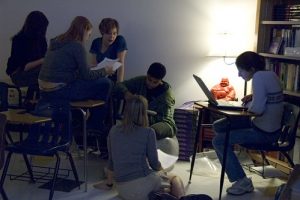Two articles read this week in class appear to show opposing points of view; two different styles of teaching. Both are correct and both are incorrect as neither article gives the reader a clear understanding of the whole. The meaning I pulled from the articles was that both styles of teaching are valid and necessary. Students need skills taught through direct instruction and they need freedom to explore and grow and build their “soft skills” without direct instruction. In a way, the ideas presented, while drastically different on the surface, have some common ground.
The first reading, a book excerpt, Teaching for Meaningful Learning: A review of research on Inquiry-Based and Cooperative learning, by Dr. Brigid Baron and Dr Linda-Darling Hammond, argues for the benefits of Inquiry based and Cooperative learning. A strong emphasis is placed on preparing students for jobs that do not exist yet and arguments are made against what is referred to as traditional methods of “memorization and application of simple algorithms” (p.1). Baron and Hammond state that these skills will not “develop students who are critical thinkers or students who can write and speak effectively” (as cited in Bransford, Brown, & Cocking, 1999; Bransford & Donovan, 2005, p.1). A strong argument, for who could argue that pure memorization would lead to any of the skills mentioned. Baron and Hammond also discuss the benefits of authentic learning. This is another point that would be challenging to argue, as any teacher who has experienced this with their students will argue that authentic learning is engaging and purposeful in a way that memorization is not.
The article in opposition, Why Minimal Guidance during Instruction does not work: An analysis of the failure of constructivist, discover. Problem based, experiential and inquiry-based learning, by Paul A. Kirschner , John Sweller & Richard E. Clark (2010) argues the converse. Kirschner et al (2010) argue that students need direct instruction to learn effectively and that Inquiry based learning is not only ineffective but may be detrimental. One interesting point I took away from this article is that the learners they appear to be referring to are novice or intermediate; without a clear definition for either term, the exact nature of each is unknown. It is then made clear that a student who was considered to be an “expert” was not included as part of this report. Kirschner et al (2010) also delve into some discussion around learning a discipline versus practicing a discipline; both of which would require differing teaching strategies. It therefore could be argued that the research they shared as a basis for their claims, deals with novice/intermediate learners who have not yet learned the skills necessary for the discipline.
It would be hard to argue against traditional teacher-led activity as an effective mean of building skills in novice and perhaps intermediate learners. One may also say that given the research on inquiry based learning and personal experience, that it may be hard to argue against inquiry-based or collaborative learning for students who have a base set of skills (they may be classified as experts) that they can take and extend further.
Contrary to the claims of the use of minimal instruction in Inquiry based learning discussed by Kirscher et al., the excerpt by Baron and Hammond states that, “Teachers also offer instruction in more traditional ways, such as lectures and explanations that are crafted and timed to support inquiry” (p.3). Interestingly, this supports the idea that minimal instruction is not always appropriate nor the best for student learning even within an Inquiry based method, leading to the conclusion that while outwardly appearing in opposition to each other, these two readings perhaps share more in common than it may initially seem.
Personal experiences and connections
My personal experiences with inquiry-based learning supports the idea that students in an open inquiry require guidance and scaffolding. Students involved in Problem Based Learning or a subject focused inquiry require basic skills before they can move on to the more authentic, self-directed tasks. Having a solid understanding of the basics allows for students to use them/ discredit them or pick them apart and create new understanding that may be more relevant and authentic. Having a solid understanding of basic skills builds confidence in students thereby giving them the ability to tackle more challenging tasks where they can apply the skills and build on them in new and different ways.
For example, musical theatre students within our class this year had the opportunity to be involved in the creation of this year’s musical. Students were involved in promoting, directing and the creation of script, music and lyrics. The students involved were actively engaged in an authentic task, they were given opportunities to lead and to make decisions. We, the teachers, were the facilitators and guides of this learning; not the instructors. These students; however, had they not had the background knowledge of music, script and directing would have been unable to successfully complete these projects. These students, without the guidance of the teachers would also have struggled to successfully complete these projects. Years of building a base of knowledge and understanding along with teacher guidance allowed them to be successful with this. The benefits the students gained as part of this project are immeasurable.
Will I continue to implement both? Absolutely!
“DSC_0074”by sicheiiyazhi is licensed under CC BY-NC-SA 2.0

You pulled out some interesting positives and negatives from both articles. Showing that one method on its own may not be the best approach. I feel this sentence of yours summarizes this perfectly: “Having a solid understanding of basic skills builds confidence in students thereby giving them the ability to tackle more challenging tasks where they can apply the skills and build on them in new and different ways.”